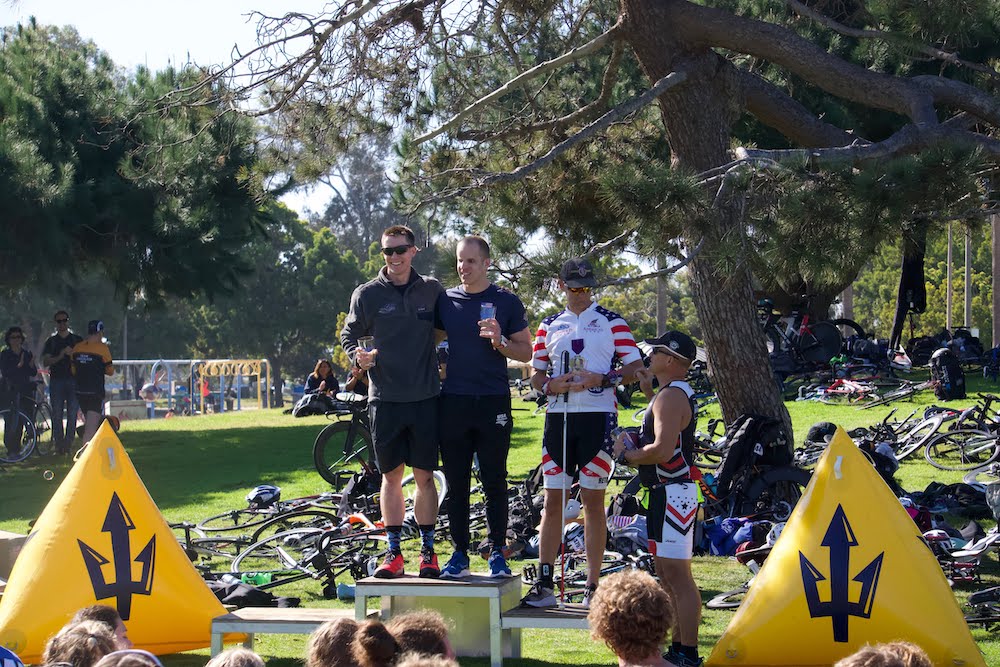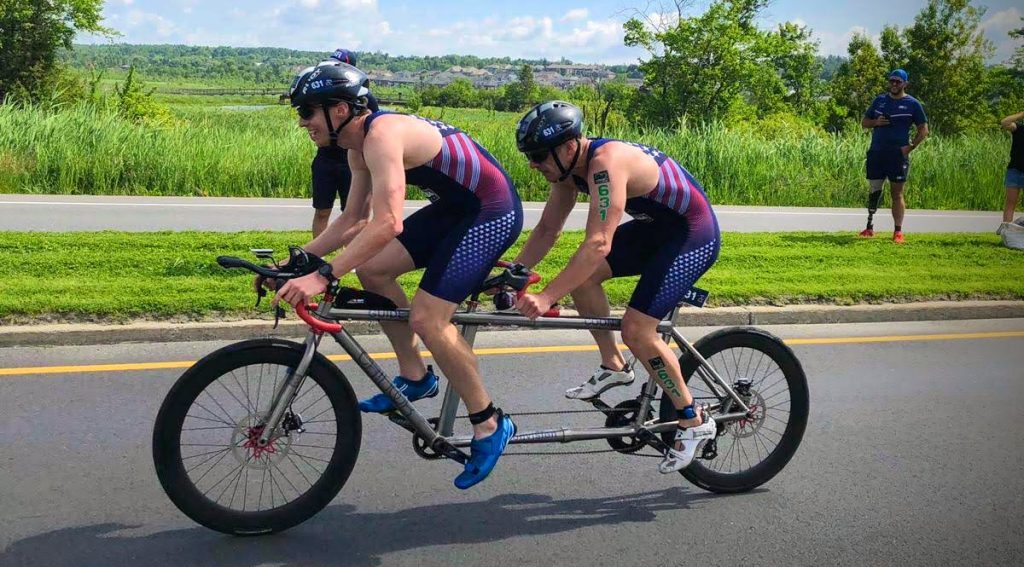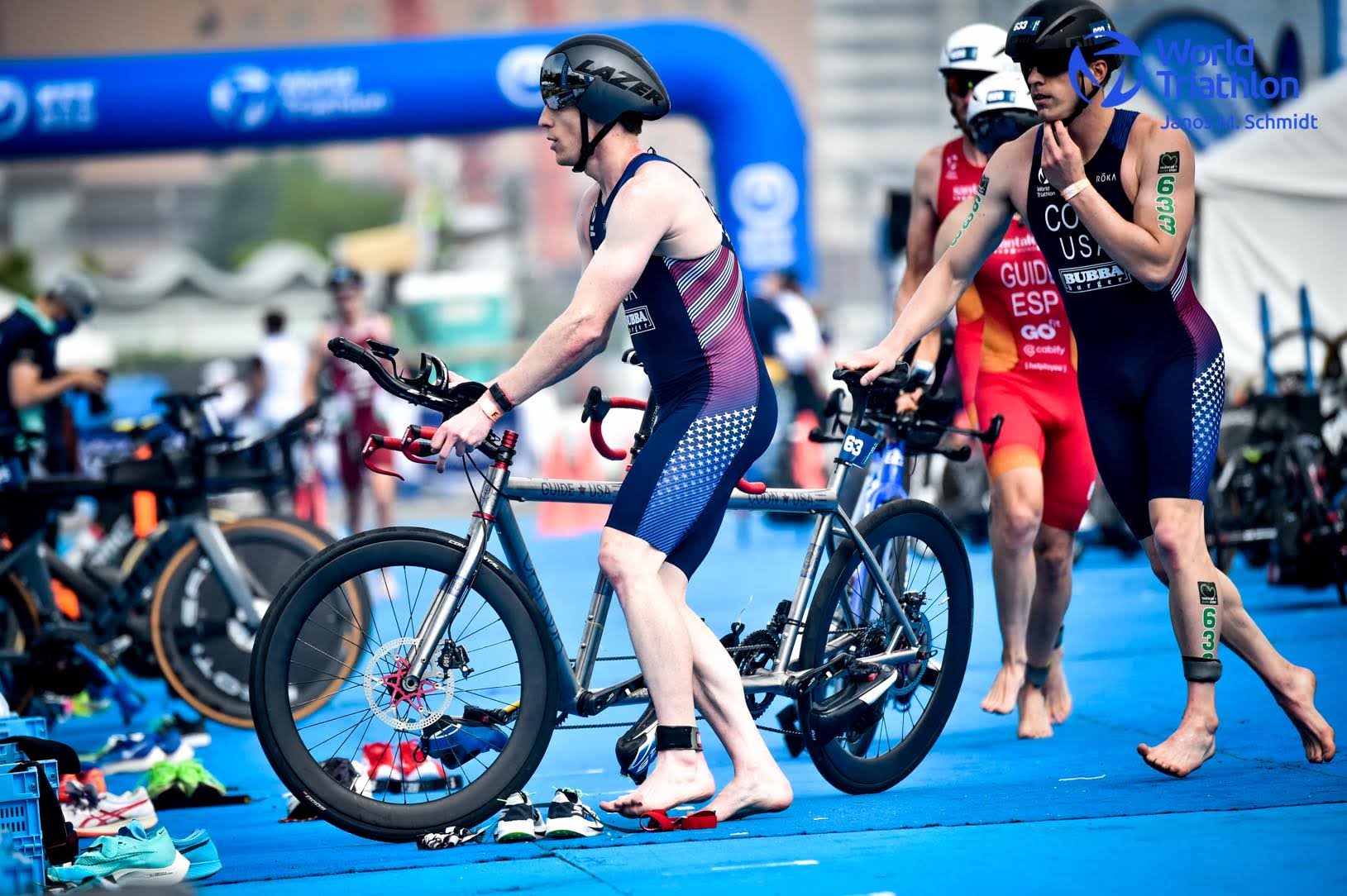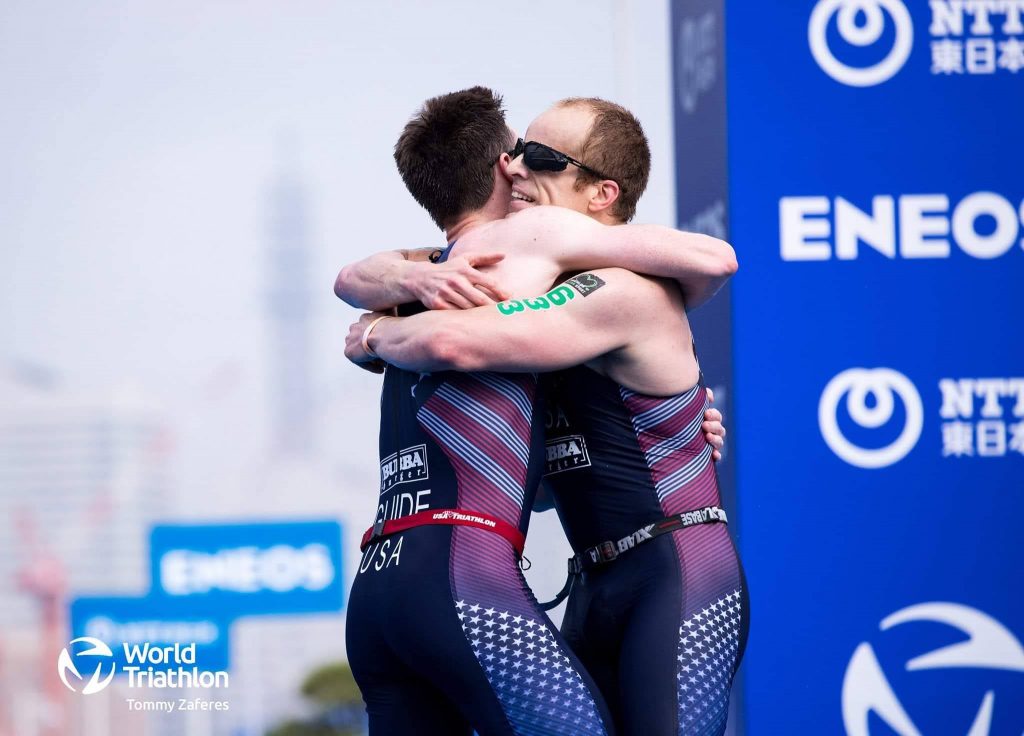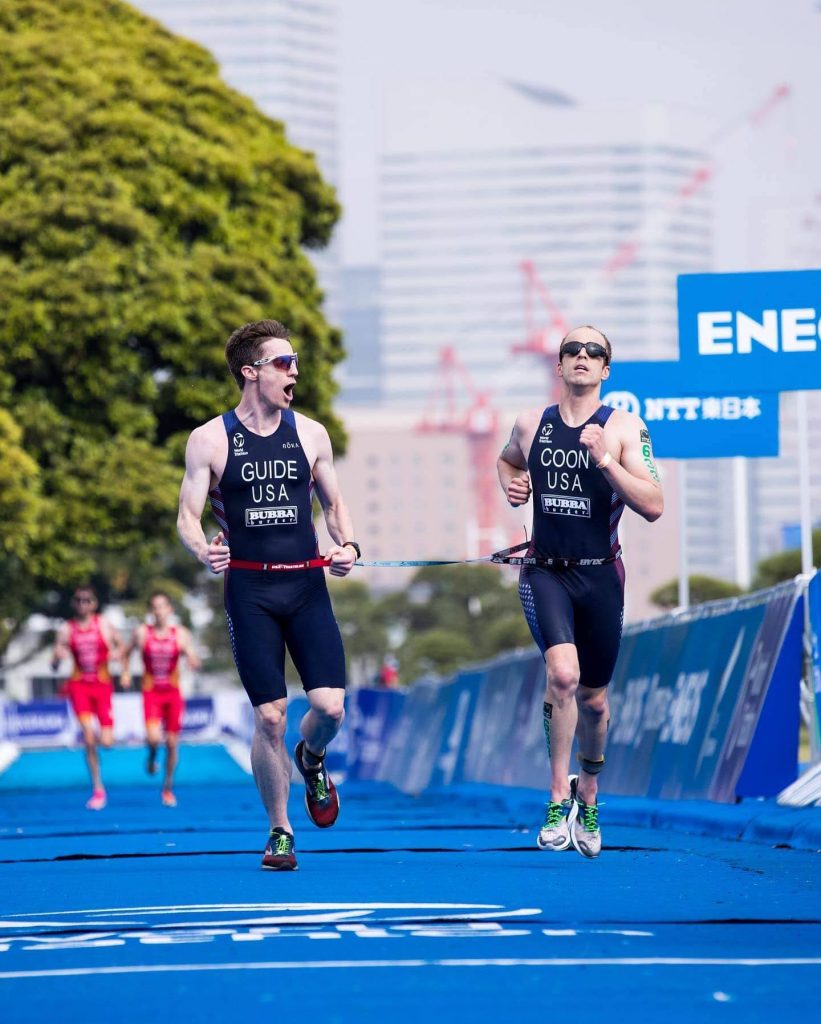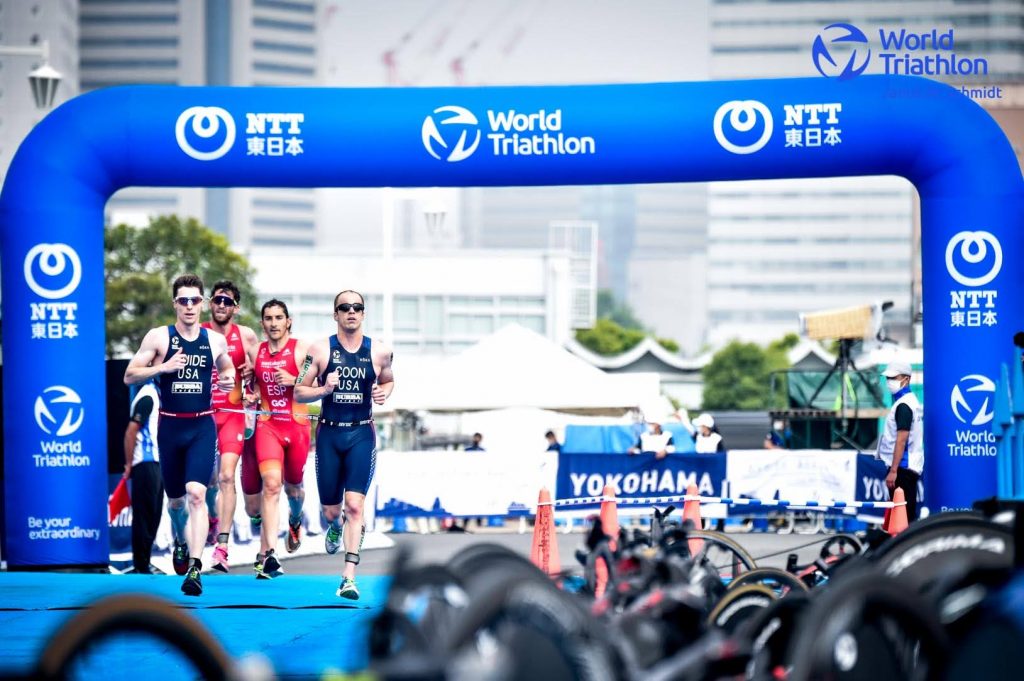Written by: Liz Henry ’08, Assoc. Director of Recreation, Engagement
Like many others, the pandemic made Sports Clubs competition almost completely obsolete starting in March 2019, but that did not stop numerous student-athletes from our varying 31 teams from excelling at the sports they love. The UCSD Triathlon Team was one of those programs that empowered student-athletes to continue to train and compete safely every chance they got. So as the 2020 Olympics closed, I was so excited about interviewing one of UC San Diego’s current triathletes, Zack Goodman. Zack is a 5th year grad student pursuing a PhD in Economics, and his research is within microeconomics – “I examine behaviors we “should” do more, like studying and choosing nutritious foods.” Zack’s story really inspired me and showcases the drive and spirit of several of our student-athletes. Below you will get to hear from Zack about his experience teaming up with Kyle Coon for prestigious Paratriathlon events like the World Triathlon Para Series in Yokohama where Kyle took first place. Kyle lost his vision at a very young age due to a rare form of eye cancer. He is now a member of the Toyota U.S. Paratriathlon Resident Team in Colorado Springs, Colorado, and will be representing Team USA at the Tokyo 2020 Paralympic Games starting August 24th, 2021. Zack and Kyle have raced together frequently since they first met, and Zack shares how collegiate sports clubs helped jump start his love for the sport of Triathlon and their journey to winning gold.
Tell us how you came to join UCSD Triathlon and what you love about the team, the sport, etc.:
I started doing triathlons as a club sports athlete during undergrad (at NC State University), and I was excited to continue as a grad student at UCSD! The conditions in San Diego are perfect for triathlon, so it’s a great place to get into the sport. Although (able-bodied) triathlon is an individual sport, our team makes it feel more like a team sport, always training together and pushing each other to be the best we can be. I loved how supportive the team was when I first joined, and now five years later it’s a joy to pass down my knowledge to our new members. I know our team will continue producing some of the best collegiate club triathletes in the US for years to come!
How did you get involved with becoming a guide? A guide for Kyle Coon?
I met Kyle at a camp for elite visually impaired (VI) paratriathletes at Camp No Sight No Limits, which is organized by Amy Dixon, a Tokyo Paralympian based out of Encinitas. Amy taught me how to guide, which allowed me to volunteer at her camp in 2018. Though I didn’t guide Kyle at that camp, when he was looking for a guide for the Sarasota-Bradenton World Cup later that year, he asked me if I would be interested. Kyle had one of his best performances to date, finishing second behind a Paralympic gold medalist, and we’ve raced together at almost all of his races since.
What does it take to become a guide? Guide at the USA level?
To become a guide in paratriathlon, one needs to be proficient at three sports (swimming, biking, and running). On the swim and run, you have to be a bit faster than the athlete you’re guiding so you can hold their pace while constantly communicating with them. In both of these two sports, you’re attached to your athlete via a tether. On the run, guides verbally call out directions while on the swim, it’s hard to hear so guides generally tap the athlete’s shoulder to indicate a turn.
Guiding the bike involves piloting a tandem, which takes some practice but eventually becomes as natural as riding a single. Guides can contribute to the outcome of the race on the bike much more than on the swim or run, so at the elite level, athletes look for the strongest cyclist they can find who are also fast enough on the swim and run to guide. At the highest level of the sport, guides are often professional or recently retired professional triathletes.
What has been your favorite part about working with Kyle in preparation for the Tokyo 2020 Summer Paralympics?
Kyle is one of the most motivated people I’ve ever met. Just a few years ago Kyle was new to elite paratriathlon, and now he’s considered one of the best in the world. Most days he trains at least three times and attacks each workout like it’s his last chance to gain some speed before the Games. His “can do” mindset and belief that hard work gets results is contagious!
Tell us a little about your experience at the World Triathlon Para Series in Yokohama. What was the feeling after you and Kyle took gold?
Yokohama was a World Paratriathlon Series race, which is the highest level of paratriathlon competition outside of the World Championships and Paralympics, and was of particular importance given the proximity to the Games. There was a lot riding on us performing well, and it didn’t help the nerves that we had to quarantine the entire week leading up to race day. We didn’t even have a chance to preview the (rather technical) bike course before riding it the first time on race day!
Kyle and I spent the entire race neck and neck with Spain’s Jose Luis, the reigning European Champion. Coming out of Transition 2 starting the run, we were within mere seconds ahead of the Spaniards, and off to a blistering pace. Kyle pushed to a pace below his personal best, and the Spaniards followed closely behind. Towards the last 800 meters, I could tell Jose Luis was breathing very hard, and I saw a small gap starting to form. I told Kyle to make a move. He picked up his pace, continuously getting faster until he was sprinting for the finish line. Once I knew he had it, his first ever international win, I couldn’t help but shout with joy. It was an epic way to win, and at such a critical point in his career – it doesn’t get any better than that.
If you want to read more about WPS Yokohama, check out Kyle’s outstanding race report.
What’s next for you in the world of triathlon? Any big goals you want to share?
Though I’m not guiding Kyle in Tokyo for the Paralympics, we will race together again after the Games. I’m currently training for Club Collegiate Nationals this September in Malibu and am especially looking forward to the team relay.
What advice or message would you give to people thinking about joining the sport of triathlon and/or the UCSD Triathlon team?
Do it! Triathlon, with its three different legs, keeps training interesting and sustainable. There are races everywhere, and the “age group” format keeps it competitive for people of all ages. If you’re a college student, especially at UCSD, I highly recommend joining the club and racing at Tritonman, our annual club-run triathlon in February.
If you’re interested in guiding, check out United in Stride! There are VI athletes of all ability levels who need guides all over the country, and this website helps connect athletes with potential guides.
As a former UCSD sports clubs athlete and women’s rugby player, I am definitely in awe of the commitment and character that Zack brings to his sport and the program. I can also share that exploring new sports and finding something you love during your undergrad career can be one of the most rewarding experiences you will have, so don’t be afraid to try something new and potentially meet some lifelong friends along the way. I asked Zack if he would reach out to Kyle to get some insights into his journey with triathlon and experience with Zack, and as you will read below, Kyle’s passion, hard work, and no limit attitude really stands out.
How did I get into triathlon and what do I love about the sport?
When I graduated from college I thought I was hot stuff and went at the working world thinking the world owed me everything, but the world was here first and I had to learn the hard way that I had to earn my way. A year after graduating I was jobless, in some pretty deep debt and directionless. I’d become pretty unhealthy and decided that I needed to get my life back on track so I decided to try running. I found a website that linked blind runners up with people interested in being sighted guides and the guy that responded to my email happened to be a triathlete. We hit it off and he eventually peer pressured me into giving triathlon a go. I was terrified of swimming in the open water but after completing my first few races I just kept wanting to get better. I loved that the harder and smarter I worked the more I improved. I loved putting together triathlon across swim, bike, run instead of thinking about it as swimming, biking and running. Triathlon is so analogous to life in that very few times is each leg of a triathlon is going to go perfectly. There’s going to be a mess up somewhere, but you have the capability to bring it back and still be stronger in the overall race.
How does it feel to represent Team USA at the Paralympics?
I strive to represent my country to the best of my ability and getting to do that in a sport that I’ve grown to love is that much sweeter. What’s even better though is that I’m getting to enjoy the experience with so many incredible teammates. The Paralympics certainly is and was a goal, but performing to the best of my ability is also super important to me, and getting to experience that with great people is even better. I’m proud that I get to go represent the USA, but I’ve still got so much work to do to improve myself as a triathlete and person.
What was my favorite memory/part of working with Zack?
Zack is a world-class guide and athlete, but he’s an even better person and friend. Zack has been with me through some high highs and low lows. Winning in Yokohama, executing our race strategy and plan was definitely a huge highlight and showed how much we can grow. The best part is though that we’re not done working together. We’ve still got so many cool and epic things to do. While Zack may not be guiding me in Tokyo, that doesn’t mean he’s not been a vital part of the team. I do not get to the Paralympics and become a Paralympian without Zack. And as long as he’s willing and able I think we’re going to have some epic races in the coming years.
What piece of advice would I give to aspiring triathletes?
Don’t be afraid. Just try. Do not get discouraged by one workout or day. You can go as far and climb as high as you want to in this sport. Hard work, dedication and passion are so critical. Just because you may not be an Olympian or Paralympian doesn’t mean you aren’t a great triathlete. At the end of the day whatever happens, never stop wanting to improve. Never stop trying to be better (not faster, but better). Strive to be a better person, friend, student, brother/sister, spouse/partner, etc. That’s what triathlon teaches us is to never stop trying.
Zack and Kyle’s ability to achieve such remarkable goals shows the power that teamwork and participation in sports can bring. With the Tokyo 2020 Paralympic Games coming up around the corner, UC San Diego Recreation will be cheering loudly for Kyle and Team USA! Whether they bring home the gold or not, their commitment and dedication to their sport and the betterment of themselves and others is a legacy that we will never forget. If you would like to learn more about UC San Diego Sports Clubs or the Triathlon Team please visit recreation.ucsd.edu/competitive-sports/sports-clubs/.

